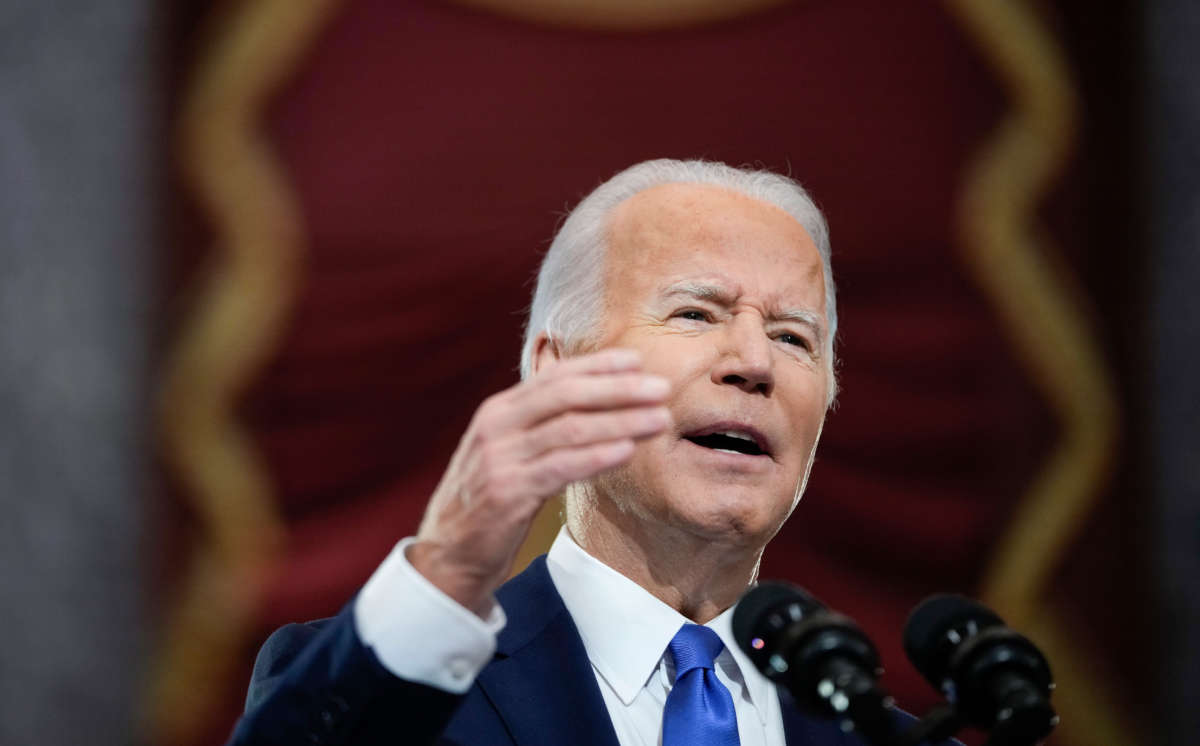Truthout is an indispensable resource for activists, movement leaders and workers everywhere. Please make this work possible with a quick donation.
President Joe Biden plans to give a speech on Tuesday in Atlanta, Georgia, to discuss the need to pass voting rights legislation at the federal level — and to express his support for changing the filibuster rule in the U.S. Senate to do so.
Republicans have used the Senate filibuster to block major voting rights bills four times over the past year. As GOP-led state legislatures across the country impose voting restrictions in response to Trump’s 2020 election loss, advocates have demanded that Democrats enact voting rights protections, even if that requires limiting the power of the filibuster.
Prior to the announcement that Biden will support changing the filibuster, a coalition of voting rights groups said that the president shouldn’t come to Georgia unless he had a plan for passing voting protections through both houses of Congress.
Speaking on voting rights without a strategy to address the filibuster issue would be “an empty gesture,” the coalition said, adding that it would “reject any visit by President Biden that does not include an announcement of a finalized voting rights plan.”
Since the coalition released their statement, the president has prepared a speech about the need to change the filibuster in order to pass voting rights bills, which he plans to give upon his arrival in Georgia.
“The next few days, when these bills come to a vote, will mark a turning point in this nation,” Biden plans to say on Tuesday. “Will we choose democracy over autocracy, light over shadow, justice over injustice? I know where I stand. I will not yield. I will not flinch.”
“I will defend your right to vote and our democracy against all enemies, foreign and domestic,” the president will go on. “And so the question is: where will the institution of the United States Senate stand?”
Democrats in the Senate have yet to determine the specific changes to the filibuster rule they will actually propose. Negotiations between moderate members in that chamber have stalled, due in large part to Sen. Joe Manchin’s (D-West Virginia) lack of consistency on the issue.
Manchin is an ardent defender of the filibuster, so it’s likely that any adjustments will be minimal, as changing the rule would require the support of all 50 senators in the Democratic caucus. But Manchin’s stance seems to change from one day to the next, sources close to the negotiations have said.
“You think you’re just about there. You think you’ve got an agreement on most of the things and it’s settling in. And then you come back the next morning and you’re starting from scratch,” one source said, adding that trying to get Manchin’s support for changing the rule has been “like negotiating via Etch A Sketch.”
Meanwhile, Senate Majority Leader Chuck Schumer (D-New York) promised a vote on changes to the filibuster by January 17 if Republicans continue to block voting rights legislation. Although that deadline is getting closer, Schumer hasn’t yet proposed specific changes to the rule.
In order to change the filibuster rule and pass voting rights legislation, the Senate “must evolve, like it has many times before,” Schumer said.
A terrifying moment. We appeal for your support.
In the last weeks, we have witnessed an authoritarian assault on communities in Minnesota and across the nation.
The need for truthful, grassroots reporting is urgent at this cataclysmic historical moment. Yet, Trump-aligned billionaires and other allies have taken over many legacy media outlets — the culmination of a decades-long campaign to place control of the narrative into the hands of the political right.
We refuse to let Trump’s blatant propaganda machine go unchecked. Untethered to corporate ownership or advertisers, Truthout remains fearless in our reporting and our determination to use journalism as a tool for justice.
But we need your help just to fund our basic expenses. Over 80 percent of Truthout’s funding comes from small individual donations from our community of readers, and over a third of our total budget is supported by recurring monthly donors.
Truthout has launched a fundraiser, and we have a goal to add 280 new monthly donors in the next 72 hours. Whether you can make a small monthly donation or a larger one-time gift, Truthout only works with your support.
